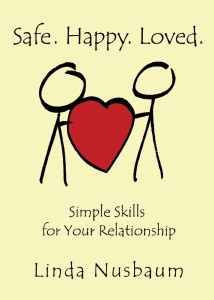Many people struggle with taking responsibility in a relationship. They feel victimized, they blame, and they feel miserable. It doesn’t have to be this way.
One of the hardest things I see couples struggle with is the idea that each person in the relationship is responsible for his or her own part of the problems that surround them. It’s not uncommon for people to want to blame the other person for how they feel as if the partner did something to cause the upset. Something bad happens and people start pointing fingers at the other person.
Many couples actually live this way for a long time; looking at their partner as if he or she is the tormentor. When couples live with this pattern it keeps them feeling helpless to change anything in the relationship. Each person keeps waiting for the other person to do something different to make them feel better.
See Your Partner as Your Lover, Not Your Tormentor

It’s as if both are waiting to feel more appreciated, valued, important to their partner and loved. But the longer they wait, the more tempting it is to blame the other person for not supplying those good feelings. Sometimes couples will even spend the next few years building cases against each other, instead of personally taking responsibility.
You know you’ve done this if you say these kinds of things to your mate, “You did this to me so I had to do this to you.” “You didn’t do this for me so I did this to you.” “If you had only done this than I wouldn’t have had to do that.” All these phrases hold the partner responsible for how you feel. They leave the person blamed feeling helpless and the accuser feeling empty, a sad place for both.
Taking Time to Assess Your Partner’s Intent
When the relationship has turned into two separate camps, I like to encourage couples to think about a couple of things. The first has to do with intent. What is the intent of your partner when he or she does something that makes you cross? Do you know? Sometimes people just assume they know what their partner intended and it’s usually not very good. I like to encourage people to find out if there is any ill will coming from the mate. To do this all a partner has to do is ask.
It could sound something like this, “Hey, when you left those dirty socks on the bed did you do that to make me mad?” I know this probably sounds silly, but chances are if you got mad because your mate left dirty socks on the bed you might want to find out if he or she did it on purpose just to piss you off. If they didn’t, don’t they deserve to forget, make a mistake or just be oblivious once in a while? Find out what they were trying to tell you, if anything, with the action before you explode.
Taking Responsibility for How You Affect Your Partner
The second thing is understand how you impact your partner. If you accuse him or her of doing something to harm you, you are blaming them for something. Ask yourself what it feels like when you get blamed. It feels terrible. Usually we get defensive and want to argue back. Try and put yourself in your partner’s shoes before you level the criticism.
If you say something you feel bad about, apologize. That’s what considerate people do. This does not make you weak. This makes you a good person. It also sends a message to your mate. It tells them, “I don’t want to stay mad at you. I want to get closer to you.”
And that’s what all couples want: closeness, connectedness, and love.
Need a Little Help Taking Responsibility in Your Relationship?
Read a Book About Understanding Needs and Taking Responsibility in a Relationship
Can’t make it on Monday? You can learn more about how to take responsibility for your contributions in your relationship by reading Linda’s book, Safe. Happy. Loved. Simple Skills for Your Relationship. It can help you understand your partner’s motivations and improve the way you communicate. Give it a read.



